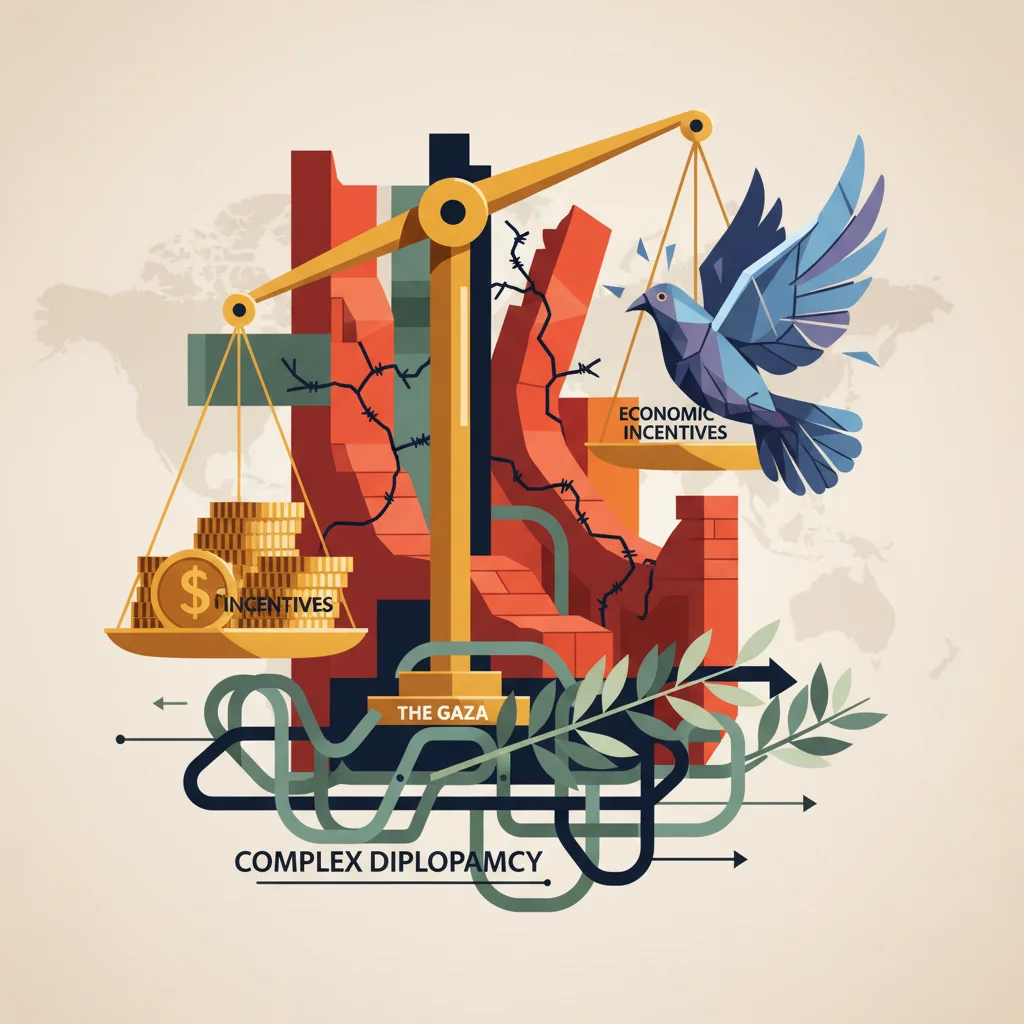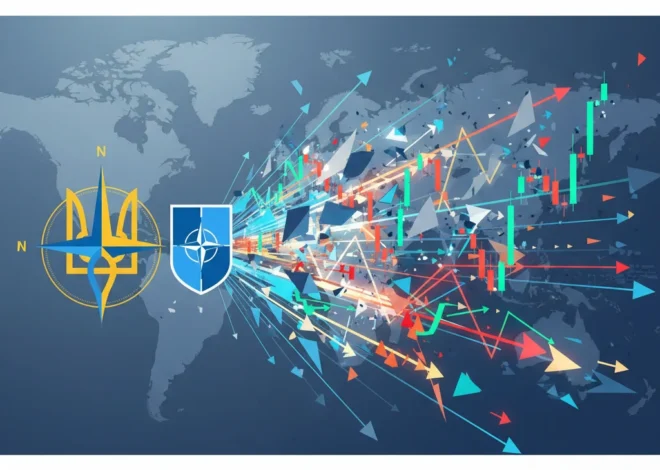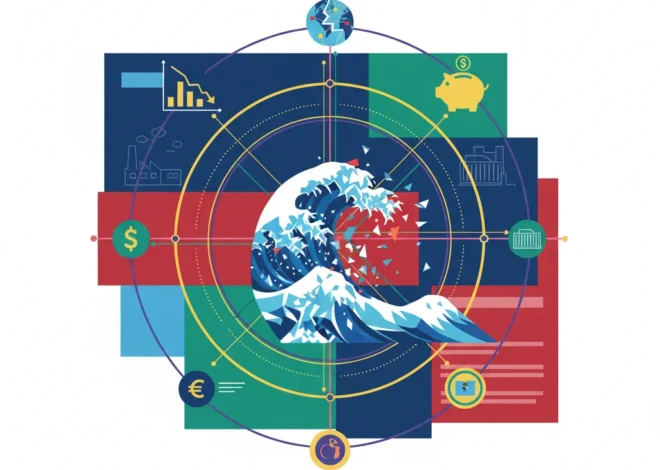
The Price of Peace: Why Economic Incentives Alone Can’t Solve the Gaza Crisis
In the complex world of international diplomacy, few challenges are as persistent and fraught with peril as the Israeli-Palestinian conflict. For decades, the global community has watched as peace plans have been proposed, debated, and ultimately discarded. One of the most prominent recent efforts, spearheaded by the Trump administration, was built on a foundation of economic statecraft—the idea that overwhelming financial incentives could pave a path to peace where political negotiations had failed. However, a critical analysis reveals why this approach, and others like it, are fundamentally flawed, carrying significant implications for global stability, the international economy, and the world of finance.
A concise but powerful letter to the Financial Times by Maj Gen (Retd) Jonathan Shaw highlighted two core reasons why such a deal was “doomed from the start.” He argued that the plan fatally misunderstands Palestinian motivations and overestimates the influence of regional Arab states. Expanding on this astute analysis, we can see a clear lesson for investors, business leaders, and policymakers: ignoring the primacy of political and national identity in favor of purely economic logic is a high-risk strategy, not just in diplomacy, but in any venture that involves human aspiration.
The Misguided Premise of “Economic Peace”
The central pillar of the so-called “Deal of the Century” was a massive investment package, promising billions in infrastructure, business development, and job creation for Palestinians. The underlying theory, often termed “economic peace,” posits that prosperity can act as an antidote to political grievance. If people have jobs, opportunity, and a rising standard of living, the argument goes, their desire for abstract concepts like statehood and sovereignty will diminish. It’s a transactional view of human nature, one that attempts to place a price tag on national identity.
This premise, as Shaw pointed out, fundamentally misreads the situation. The Palestinian struggle has never been solely about economic well-being; it is rooted in a century-long quest for self-determination, land, and a recognized national home. To offer financial benefits in exchange for abandoning these core political aspirations is viewed by many Palestinians not as a pragmatic compromise, but as an attempt to purchase their surrender. Historical data supports this view. A 2019 poll by the Palestinian Center for Policy and Survey Research found that an overwhelming 90% of Palestinians would reject the Trump plan even if it meant receiving billions in aid (source). This isn’t an anomaly; it’s a consistent reflection of a people prioritizing political rights over “blood money.”
For those in the world of investing and economics, this is a crucial lesson in risk analysis. Standard economic models often assume rational actors making decisions based on financial incentives. However, geopolitics is frequently driven by non-financial, emotion-laden factors like identity, dignity, and historical grievance. Ignoring these “irrational” variables can lead to catastrophic miscalculations. A region simmering with unresolved political tensions is a powder keg for the global stock market, capable of disrupting supply chains, sending energy prices soaring, and erasing market value overnight.
The Myth of Regional Puppeteers
The second fatal flaw in the plan was its reliance on regional Arab powers, particularly Saudi Arabia and the UAE, to persuade—or pressure—the Palestinians into acceptance. This strategy was based on the shifting geopolitical landscape in the Middle East, where several Gulf states, driven by a shared concern over Iran and a desire to diversify their economies, have moved towards normalizing relations with Israel, as seen in the Abraham Accords.
The assumption was that these powerful Arab nations, who have historically been the financial patrons of the Palestinian cause, could effectively “deliver” Palestinian compliance. This, however, overestimates their influence and misunderstands the internal dynamics of the Arab world. While Gulf leaders may be recalibrating their foreign policy, the Palestinian cause remains deeply resonant with the general populace across the Arab world, often referred to as the “Arab street.” Forcing a deal perceived as unjust upon the Palestinians would risk domestic backlash and undermine the legitimacy of these regimes. As Jonathan Shaw notes, “the Palestinian leadership cannot be delivered by Riyadh.”
This dynamic has direct consequences for the regional economy. The Gulf states are aggressively trying to position themselves as global hubs for finance, trade, and fintech. Their success hinges on projecting an image of stability and long-term vision. Becoming entangled in a deeply unpopular and coercive peace process would introduce a level of political risk that international investors abhor. True regional economic integration, a goal that could unlock trillions in value, cannot happen while the core conflict remains a source of perennial instability. The promise of inter-regional blockchain-based trade finance or unified capital markets remains a distant dream as long as the political foundation is fractured.
The £2.1 Billion Keyboard Stroke: How a Cyber Attack Became the UK's Costliest Financial Disaster
The Tangible Costs of an Intangible Conflict
When diplomatic efforts fail, the consequences are not merely political; they are profoundly economic. The absence of a lasting peace carries a quantifiable cost that ripples through both the regional and global financial systems. The RAND Corporation conducted a comprehensive study on this very topic, calculating the economic toll of the conflict over a decade. Their findings are staggering.
Below is a simplified look at the economic opportunity costs versus the status quo, based on RAND’s analysis. It illustrates the immense financial upside of a stable two-state solution compared to the continued drain of conflict.
| Scenario (over 10 years) | Estimated GDP Impact for Israel | Estimated GDP Impact for Palestine |
|---|---|---|
| Continuation of Conflict (Status Quo) | -$10 Billion (Security Costs, Lost Trade) | -20% of potential GDP (Lost Investment & Access) |
| Violent Uprising / War | -$45 Billion (Direct Costs & Economic Shock) | -46% of potential GDP (Infrastructure Destruction) |
| Stable Two-State Solution | +$120 Billion (Peace Dividend, Increased Trade) | +$50 Billion (Sovereign Economy, Investment Boom) |
Data adapted from the RAND Corporation’s “The Costs of the Israeli-Palestinian Conflict” study.
These figures demonstrate that peace is not just a political ideal; it is the single greatest economic stimulus package imaginable for the region. For international investors, a resolution would de-risk the entire Eastern Mediterranean, opening up new markets and opportunities in technology, tourism, and energy. Conversely, continued instability acts as a permanent tax on the region’s potential. It affects everything from banking stability and insurance premiums to the viability of cross-border trading platforms. Every flare-up sends shudders through the oil markets, a key indicator for the health of the global economy.
The £2.1 Billion Breach: How the Jaguar Land Rover Hack Rewrote the Rules of Financial Risk
Conclusion: A Path Forward for Peace and Prosperity
The failure of economically-centric peace plans for Gaza and the West Bank offers a sobering but essential lesson. Lasting peace cannot be bought; it must be built on a foundation of mutual respect, political dignity, and the acknowledgment of national rights. Economic development is a vital component of any sustainable peace, but it must be a *consequence* of a political solution, not a substitute for one.
For the global financial community, the stakes are clear. The Israeli-Palestinian conflict is not a distant, localized dispute. It is a critical factor in global economic stability, a key variable in energy prices, and a major source of risk for international markets. Advocating for and supporting a comprehensive peace process—one that honors both the political aspirations and economic needs of all parties—is not an act of charity. It is a pragmatic investment in a more stable and prosperous future for all.


